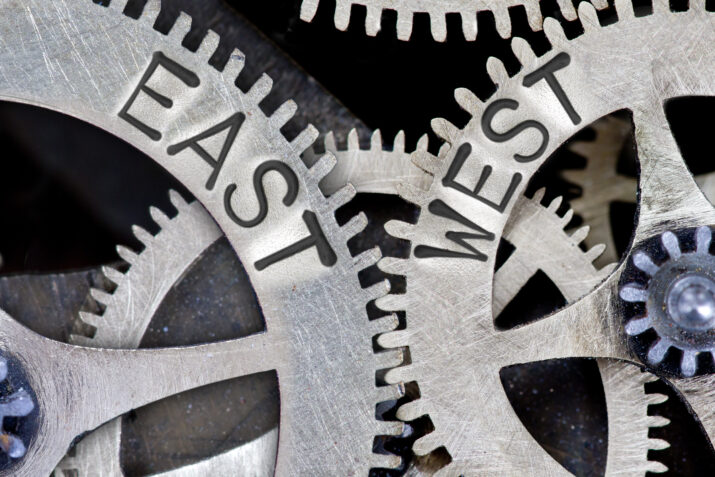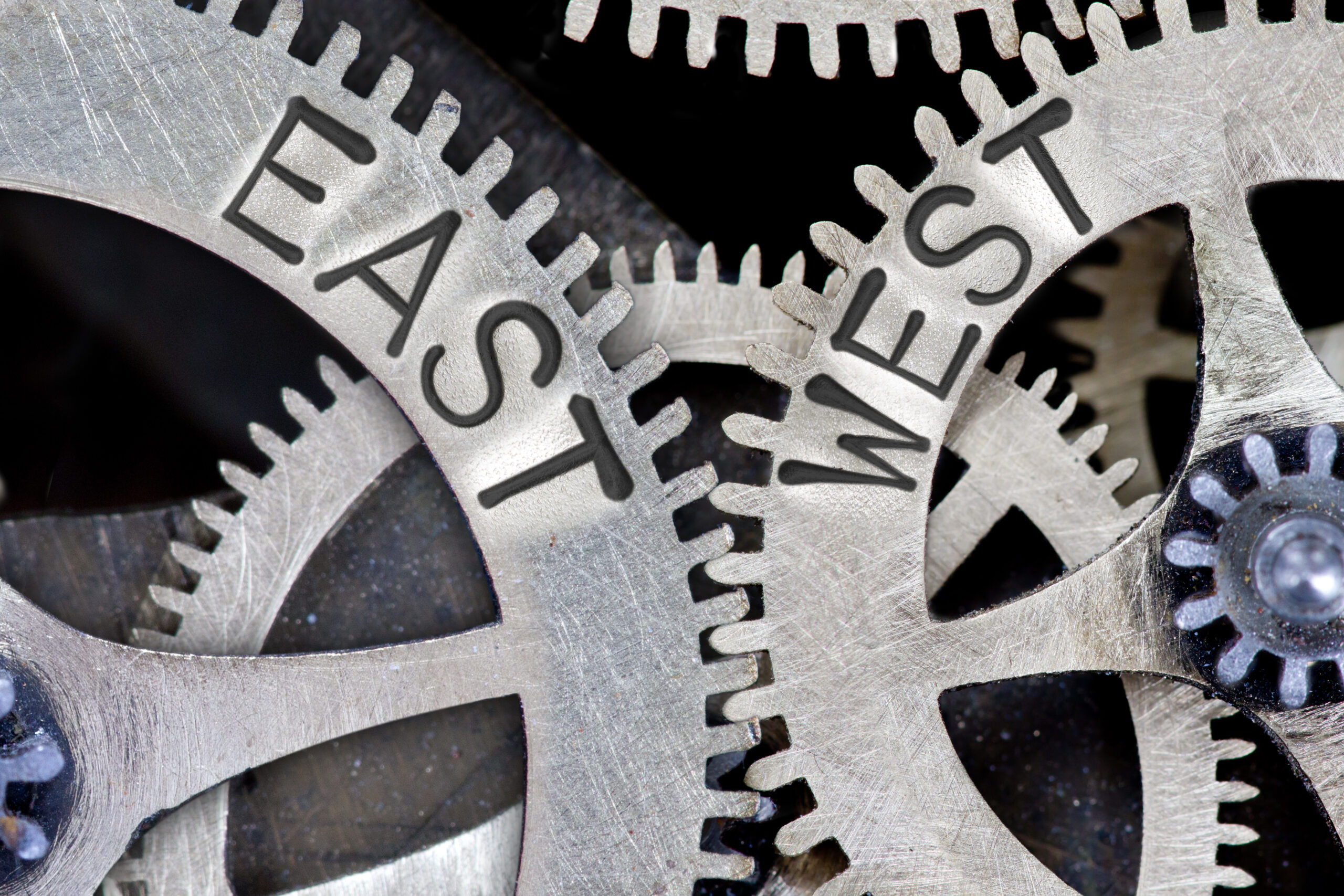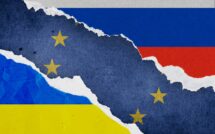
“Are You Paying Attention to Us Now?” Recognizing the Centrality of Central and East European Countries

This is part of our special feature, Europe and NATO Since Ukraine.
In his 2009 book, The Next 100 Years, the forecaster George Friedman projected that the global superpower of the United States would be challenged by three international actors—Japan, Turkey, and Poland. His projection was that by 2020 China would fragment, providing Japan and Turkey with the opportunity to form an alliance to oust the US from Asia. According to Friedman, the combined military forces of Tokyo and Ankara will invariably come into conflict with Russia (among many other countries), which will lead Turkey to conquer Ukraine. According to this scenario, Poland will become the leader of an East European coalition seeking to curb the Japanese-Turkish incursion into the continent. Friedman’s point was that Germany, the traditional European power, “will neither have the appetite nor the power to challenge the Polish bloc.”[1] As the saying goes, the issue with forecasting—regardless of whether it is strategic or clairvoyant—is that it is difficult to do, especially when it concerns the future; yet, if one makes enough predictions, eventually one of them is bound to come true.
Indeed, a little over a decade after Friedman made his predictions, Poland and the countries of Central and Eastern Europe (CEE) appear to be taking the center stage of European affairs. Even though most CEE states have been members of the European Union (EU) since the 2004-2007 “big bang” enlargement, it was the full-scale Russian (not Turkish) invasion of Ukraine in February 2022 that seems to have brought the acknowledgment of their foreign policy agency. From providing armaments and diplomatic support to hosting refugees and pushing their counterparts in Western Europe, North America, and beyond to offer more advanced weapons systems and include Kyiv in European and Euro-Atlantic organizations, the CEE states have been at the forefront of the Ukrainian support network.
Reflecting on this trend, the German chancellor Olaf Scholz acknowledged that the “center of Europe is moving eastward,”[2] while the President of the European Commission, Ursula von der Leyen admitted that “we should have listened to the voices inside our Union—in Poland, in the Baltics, and all across Central and Eastern Europe. They have been telling us for years that Putin would not stop.”[3] The French president, Emmanuel Macron, also had to apologize for the haughty attitude of France’s past leaders toward East Central Europe. Decrying a statement made by his predecessor, Jacques Chirac, who in 2003 said that the CEE states had “missed a good opportunity to keep quiet” over their support for the US in Iraq, Macron instead proclaimed that “some said you had missed an opportunity to shut up. I think we also lost an opportunity to listen to you. This time is now over.”[4]
So what are the CEE countries doing with this recognition? Are CEE voices really heeded in European and transatlantic debates? While the evidence is still mixed, CEE states’ leaders certainly feel more buoyed to assert their views, and it appears that their statements are falling on more receptive ears. Yet, while the full-scale Russian invasion of Ukraine might have been the moment that forced such recognition, CEE countries have been challenging their marginalization for quite some time. This has become particularly prominent in the decisions that some CEE states have made with regard to China and the nascent European Indo-Pacific strategy.
Challenging “Westplaining” in out-of-Europe areas
Despite CEE membership in both the EU and NATO, CEE policymakers and scholars have been frustrated by the persistent patronizing attitudes of their Western counterparts. Labelled as “Westplaining,” such silencing and stigmatization of CEE experiences and expertise forced analytical explanations and political prescriptions onto the region.[5] In this respect, while regions from outside Western Europe and North America have reclaimed their epistemic significance in the development of fresh policy frameworks and analytical perspectives on the explanation and understanding of global life, the CEE region appears to have remained excluded from this trend. Mainstream realist theory in the US has consistently denied the agency and aspirations of the CEE countries. John Mearsheimer, for example, one of the most prominent US foreign policy commentators, has, in effect, blamed the US and Ukraine for the Russian invasion. For many in the region, it has been particularly jarring that while Russian agency and claims to neocolonial treatment by the West have been accepted and normalized, the validity of CEE colonization by the Soviet Union and Russia has not been so easily granted. Instead, Western European leaders and foreign policy experts have told their counterparts in CEE countries that they were either too emotional or too hung up on their past (or both) and needed to move on. As the Polish foreign minister Radosław Sikorski acknowledged, he has been told time and again that “you over-nervous, over-sensitive Central Europeans are prejudiced against Russia.”[6]
In this respect, it appears that it was the interaction between the CEE countries and external actors that has furnished the confidence to CEE leaders to assert their agency in international life. The interactions between CEE countries and China have been particularly significant. While China’s global footprint has been growing steadily since the late 1970s, its outreach in the CEE region has had a very recent provenance. China has been far too distant geographically, historically, and ideationally to have meaningful resonance in the political, cultural, and (until very recently) economic imaginaries of the CEE region. During the Cold War, most of the CEE states (apart from Albania and, to an extent, Romania) sided with Moscow during the Sino-Soviet split. The fall of communism across the region reinforced this trend. Some of the protesters who began gathering at the Tiananmen Square in April 1989 took inspiration from the nascent democratization of the CEE countries. Motivated by a fear of contagion, the Chinese leadership ordered the violent suppression of the protesters on June 4, 1989—the very same day as the first multi-party elections in Poland, a communist CEE country.
Consequently, for much of the post-Cold War period, both China’s and the CEE countries’ leaders remained largely aloof to each other. The political chaos, ethnic tensions, and economic turbulence that marked the post-communist transitions in the CEE region provided the Chinese leadership with ample evidence for the dangers of political “opening up.” At the same time, the CEE countries remained primarily focused on their integration into European and Euro-Atlantic institutions, which did not leave much foreign policy space for the development of relations with other regions and parts of the world. Thus, it was only the 2007-2008 sovereign debt crisis, during which Beijing was invited to take an active role in the bailout and economic recovery of the continent, that brought the wider CEE region to China’s attention. Greece, whose economy was severely affected by the crisis, came under immense pressure from its creditors to sell the country’s national assets. One of the first items on the Greek government’s privatization bloc was the port of Piraeus. The China Ocean Shipping Company (COSCO) acquired the operating rights for the container terminal in 2008, and by 2021 it controlled a 67 percent stake in the port.[7]
COSCO’s investments in Piraeus put the CEE region firmly on China’s investment and foreign policy menu. In 2009, the automaker Great Wall Motors opened a joint venture in Bulgaria, whose opening was witnessed by the then vice president, Xi Jinping. In 2010, Premier Wen Jiabao visited Piraeus to demonstrate China’s contribution to the European economic recovery, and a few months later he visited Budapest to attend the China-CEE economic and trade forum. And it was during Premier Wen’s 2012 trip to Warsaw that Beijing’s bespoke framework for China-CEE cooperation (better known as the “16+1”) was formally launched. It was in the context of this relationship that Beijing approached the CEE countries as full-fledged “European” actors—a recognition that they had not received from their Western counterparts. And, perhaps paradoxically, it is this experience of being treated as independent actors that has enabled some CEE countries to begin asserting their own agency not only vis-à-vis Beijing but also Brussels (and Washington).
The spotlight has fallen on the case of Lithuania, which in May 2021 became the first CEE country to pull out from the China-CEE cooperation agreement. Such move was motivated by Vilnius’ normative commitment to support “those fighting for freedom from Belarus to Taiwan.”[8] Following on these ambitions in November 2021, Lithuania opened a “Taiwanese” representative office in Vilnius, which led Beijing to withdraw its ambassador and impose sanctions on Lithuania. The following year, Estonia and Latvia also suspended their participation in the China-CEE cooperation forum. At the same time, in July 2023 just a few days before the Vilnius summit of NATO, Lithuania launched its own Indo-Pacific Strategy as a reaction to “global geopolitical shifts that have a direct effect on our country and the EU.” And while Lithuania’s leaders have insisted on prioritizing their country’s relations with NATO’s Indo-Pacific partners such as Australia, Japan, New Zealand, and South Korea to curb China’s authoritarian outreach, Vilnius’ has signaled to Brussels that it seeks to ensure “active participation in EU decision-making processes.”[9] Thus, Lithuania’s actions posed a direct challenge not only to China’s red lines but also to the EU’s attempt to maintain pragmatic economic relations with Beijing at the expense of human rights and democracy.
Yet, Lithuania was not the only CEE state to push back against Beijing in its struggle for the recognition of its foreign policy agency. Quite a few CEE states voiced criticisms of China during the 2019 pro-democracy protests in Hong Kong. Coinciding with the thirtieth anniversary of the fall of the Berlin Wall, the Hong Kong protests triggered memories of the “velvet revolutions” in the CEE countries. In particular, Hongkongers’ use of tactics developed by CEE dissidents—such as the Lennon Wall and the Baltic Way—resonated in the region.[10] The Lennon Wall, named after the image of John Lennon that was painted on it in 1980 is located in Prague; it has provided space for the expression of anti-government statements and sentiments. In a similar way, protesters in Hong Kong covered the staircase outside the Hong Kong Government Office with post-it notes expressing their support for the democracy in the city-state. On the 30th anniversary of the 675-kilometer-long human chain across the Baltic states opposing their occupation by the Soviet Union, Hongkongers joined hands to protest Beijing’s interference. Across the Baltic states, commemorations of the collapse of the Soviet Union involved support for Hong Kong’s plight, which provoked negative reactions from China. For instance, in August 2019, Chinese diplomats in Lithuania attacked people who had gathered in solidarity with Hong Kong. A month later, a group of self-styled “Chinese patriots” defaced the original Lennon Wall in Prague with graffiti celebrating the 70th anniversary of the founding of the People’s Republic of China. At the same time, representatives of CEE states have condemned China’s human rights violations in Tibet and Xinjiang. The president of Slovakia, Zuzana Caputova, has been one of the most vocal critics of China’s treatment of minorities and dissidents.
Likewise, in September 2020, the president of the Czech Senate, Milos Vystrcil, made the emblematic pronouncement, “I am Taiwanese,” on the floor of the Taiwanese Parliament.[11] His words consciously echoed the 1963 statement by US president John F. Kennedy, “Ich bin ein Berliner.” Vystrcil stressed that Taiwan was a beacon of democracy, freedom, and human rights and that it was being bullied and threatened with occupation by its larger, authoritarian neighbor across the Taiwan Strait—a situation not unlike that the CEE states had suffered during the Cold War at the hands of the Soviet Union.
While obviously targeting China, the brinkmanship of CEE states has also pushed the self-avowedly “geopolitical” European Commission led by Ursula von der Leyen to follow through on its commitments. The treatment of Lithuania by China forced Brussels to adopt its Anti-Coercion Instrument and speed up the consolidation of the EU’s Foreign Direct Investment screening mechanism. The point is that if a few small CEE states are able to challenge a global actor such as China, a coherent EU strategy implemented with the active participation of CEE countries can have significant leverage not only over Beijing but more generally. If the EU mustered even a small portion of Lithuania’s courage, not only would it benefit European security and strategic flexibility on the continent, but it might also help Europe fulfill its long-touted “superpower” potential.
Is small beautiful? What is next in the CEE’s push for recognition
If Friedman’s forecasting is anything to go by, one should heed warnings against offering any projections about the future. The start of 2024 seems to offer little reason for hope in Europe. As the war in Ukraine grinds on, its outcome is becoming victim to the bitter domestic polarization in Europe and in North America. In Europe, the Hungarian PM Viktor Orbán is holding the continent hostage to his kleptocratic authoritarian whims. The EU itself is in woeful need of revising its decision-making process and articulating a meaningful new vision for itself and others. In the US, lawmakers pandering to a Trumpian death-cult are abandoning the very tenets of American foreign policy and sacrificing Washington’s global status hell-bent on payback against an administration that they perceive to be illegitimate. Policymakers both in Brussels and across European capitals are holding their breath in anxious anticipation and engaging in furtive conversations about the future of the trans-Atlantic partnership, which survived the Soviet Union and its demise but might be undone by a forthcoming US president.
These developments must be only music to the ears of both the Russian president Vladimir Putin and the Chinese leader Xi Jinping. Despite the massive loss of Russian lives and military equipment, Putin appears to be winning the war of endurance with Ukraine’s supporters through a combination of hybrid warfare, willing henchmen, and the fickleness of Western will. The latter should only embolden Xi in the pursuit of his “China Dream” for “national rejuvenation” through the elimination of internal dissent, various forms of ethnic, religious, linguistic, and other forms of difference, and the “reunification” of a recalcitrant province across the Strait and rocks dispersed throughout the South China Sea. Not only that, but in November 2023, the “bad boy” Lithuania announced that it is beginning a process of “normalizing” its relations with China. Understandably, Beijing was quick to welcome Vilnius’ “correction of its earlier mistakes” by lifting its coercive trade sanctions.[12]
What does this say about the CEE countries’ struggle for recognition within European policymaking? There are two key takeaways: The first one is that the experience of CEE countries with China—especially as demonstrated by the case of Lithuania—indicates that for the time being both they and the EU need to curb their ambitions to the geographic confines of the continent. The realization that the EU is a continental and not a global power requires a significant recalibration of European discourses and strategies. While “derisking” from China is still a strategic priority for Europe, the continent faces far more immediate threats closer to home. Equally significantly, the CEE experience indicates that Europe’s North-American and Indo-Pacific partners do not consider Russia or its invasion of Ukraine to be of similar significance as the threats—regardless of whether they are real or perceived—posed by rising China. In this respect, the EU needs to focus on developing the capabilities to defend the continent on its own. While a significant challenge, such development is an opportunity for the consolidation of the EU’s evolving policy of “strategic autonomy.”
The second takeaway is that the EU’s geopolitical approach is challenged by its own foreign policy identity. The EU’s identity as a self-declared “normative power” is outdated and no longer fits into a world of geopolitical turmoil and struggle. This identity leads to a strategic misalignment of focus. As demonstrated by the full-fledged Russian invasion of Ukraine, the recalibration of the EU foreign policy identity has to focus on three central pillars. First, the EU must invest in innovation that can assist the development of European economic resilience. Second, the EU must develop its own hard power capabilities. The era of trade-centric focus and economic power, which once allowed Europe to exert its norms, is now giving way to an era of building both hard and sharp power. Third, and perhaps paradoxically, the EU can become a credible global actor, but only if it can demonstrate its capacity to defend its strategic periphery.
The EU’s lack of willingness to protect its strategic backyard, even in the face of war and severe attacks on critical energy and communication infrastructure, calls in question its capacity and credibility as a geopolitical actor. Thus, when their Western counterparts were surprised by the full-scale Russian invasion of Ukraine, many in the eastern part of the continent felt simultaneously vindicated and infuriated as their warnings had fallen on deaf ears. For decades, East European countries had warned about the nature of Russia’s imperial policies in what Moscow perceives as its neighborhood. As indicated by their brinkmanship with Beijing, some CEE countries have demonstrated that they are not afraid to take a principled stand in the face of growing authoritarian encroachment from external actors such as China or Russia. The full-scale Russian invasion of Ukraine not only offered a confrontation with these ongoing dynamics but provided an opportunity to unmap the region from its conventional location on the peripheries of European and global affairs. The CEE countries’ agency on the international stage has been catalyzed by their position as “frontline democracies.”[13] The assertion made by CEE countries’ leaders is that their views should be “listened to” not only with regards to Russia, as they have expertise on a range of other issues. The claim of the CEE capitals has been that the acknowledgment of their centrality in the European policymaking process will help Brussels regain a more consolidated “European voice” not only in the EU’s relations with authoritarian actors such as Moscow or Beijing but also in securing a “stronger role for Europe in the world.”
Emilian Kavalski is the NAWA Chair Professor of Complex Systems at the Jagiellonian University in Krakow (Poland) and the book series editor for Routledge’s “Rethinking Asia and International Relations” series. His work explores the interconnections between the simultaneous decentering of international relations by post-Western perspectives and non-anthropocentric approaches. He is the author of four books, including The Guanxi of Relational International Theory (Routledge 2018) and the editor of twelve volumes, including World Politics at the Edge of Chaos (State University of New York Press, 2016).
[1] George Friedman, The Next 100 Years (New York, Doubleday, 2009).
[2] Euronews, “Olaf Scholz says EU must reform to cope with enlarging to 30-36 members,” https://www.euronews.com/business/2022/08/29/olaf-scholz-says-eu-must-reform-to-cope-with-enlarging-to-30-to-36-members
[3] Ursula von der Leyen, “2022 State of the Union Address,” https://ec.europa.eu/commission/presscorner/detail/ov/speech_22_5493
[4] Reuters, “Macron tells Eastern Europe – we should have listened to you over Russia,” https://www.reuters.com/world/europe/frances-macron-offers-mea-culpa-eastern-eu-nations-russia-2023-05-31/
[5] Jan Smoleński and Jan Dutkiewicz, “The American Pundits Who Can’t Resist ‘Westsplaining’ Ukraine,” New Republic, https://newrepublic.com/article/165603/carlson-russia-ukraine-imperialism-nato
[6] Politico, “‘We Told You So!’ How the West didn’t listen to the countries that know Russia best,” https://www.politico.eu/article/western-europe-listen-to-the-baltic-countries-that-know-russia-best-ukraine-poland/
[7] Emilian Kavalski, “Between ‘Trojan Horses’ and ‘Anti-China Vanguard’?,” New Eastern Europe, https://neweasterneurope.eu/2023/11/20/between-trojan-horses-and-an-anti-china-vanguard/
[8] Maximilian Mayer and Emilian Kavalski, “Have We Reached Peak China,” Politico, https://www.politico.eu/article/have-we-reached-peak-china/
[9] Lithuania’s Indo-Pacific Strategy, https://urm.lt/uploads/default/documents/ENG%20Strategy.pdf
[10] Emilian Kavalski, “How China Lost Central and Eastern Europe,” The Conversation, https://theconversation.com/how-china-lost-central-and-eastern-europe-142416
[11] Emilian Kavalski, “Is China Out of the Window in the CEE?,” https://www.echo-wall.eu/china-through-european-lens/off/china-out-window-cee
[12] AJOT, “China lifts trade ‘coercion’ against Lithuania,” https://www.ajot.com/news/article/china-lifts-trade-acoerciona-against-lithuania-envoy-says
[13] “A High-Level Panel of Frontline Democracies,” https://urm.lt/default/en/news/a-high-level-panel-of-frontline-democracies-held-in-vilnius
Published on February 15, 2024.




